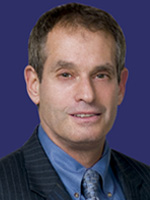Goldklang Attacks Cancer as an Oncology Coach
"Every day I am uplifted by the positive difference I can make for patients, and admire their determination and courage,” said Goldklang.
Georgia Cancer Specialists’ Dr. Gerald Goldklang focuses on the treatment of adult tumors and the use of molecular biology in his oncology/internal medicine practice.
A former athlete, Dr. Goldklang understands the importance of working as a team leader for his patients to create a care plan that will meet their goals to “beat” their challenging diagnosis.
“Both of my parents and 8-year-old son had cancer diagnoses, and through that experience, I gained firsthand insights into the challenges that face both cancer patients and their family. Every day I am uplifted by the positive difference I can make for patients, and admire their determination and courage.”
Get The AJT Newsletter by email and never miss our top stories Free Sign Up
Jaffe: What are some of the recent strides in cancer treatment?
Goldklang: The most exciting advances in the last five years have been treating advanced cancer with “targeted” therapy. There, we are looking to find certain cancer mutations (“drivers” that promote cancer growth) and hoping to find a targeted therapy to stop or kill the cancer. As these agents are non-chemo, we see none or fewer side effects generally associated with treatment. Thus, quality of life for a patient receiving targeted therapy is better.
Jaffe: What about diagnostic radiology?
Goldklang: There can be improved staging when a diagnosis is made to decide if surgery is appropriate in cancers (like lung and gastrointestinal). The PET (positron emission tomography) scan has helped better define both the extent and aggressiveness of the cancer and, when combined with the CT [computerized tomography] scan, has led to the most accurate staging possible with an accuracy in the 90 percent range!

PET scanning has also been used to better-define the response to chemotherapy and help identify treatments likely to lead to a cure.
Jaffe: What would you recommend that patients with recurring cancer communicate to their oncologist?
Goldklang: Have an updated biopsy for “molecular profiling.” This can also be on a new tumor. Cancers can mutate and, over time, demonstrate different characteristics. This molecular profile may identify mutations, some of which may be the “driver.” Treatment can then be directed specifically to target it and lead to better outcomes.

Jaffe: How are patients dealing with side effects?
Goldklang: Another significant advance in oncology is preventing or significantly ameliorating side effects as we now have several different effective anti-nausea agents and a variety of bone marrow growth factors usually given as an easy injection under the skin to lessen anemia and infection risks.
Jaffe: What are things that cancer patients can do themselves to improve?
Goldklang: Recent data demonstrates aerobic activity (120 minutes or more a week), particularly weight-bearing, can improve outcomes in certain cancers and lessen osteoporosis due to treatments.
A lot has been written about diet. Four months ago, a study showed that plant-based nuts (not peanuts) of three to five servings a weeks were shown to help outcomes in colon cancer (and possibly other types).
The use of daily aspirin has been associated with both cancer prevention and improved outcomes in certain situations (if no contraindications exist). There’s no one diet physicians agree upon other than following the American Heart Association guidelines.
Jaffe: You think outside the box. What’s next?
Goldklang: I have seen how patients doing so-called “alternative” things often do better than others. Specifically, this has to do with mind-body activities. I have worked with a psychoneuroimmunologist to help patients focus on things like meditation and laugh therapy. Often a combination of standard and complementary therapy works best.
I will be working on adding physical therapy and personal training to the overall treatment of patients to achieve the goals of improved quality and quantity of life.
The survival rate for most cancers has improved due to not only more effective drugs, but also lessening lethal side effects such as infection, and better patient education about when to inform their physician for immediate attention.





comments